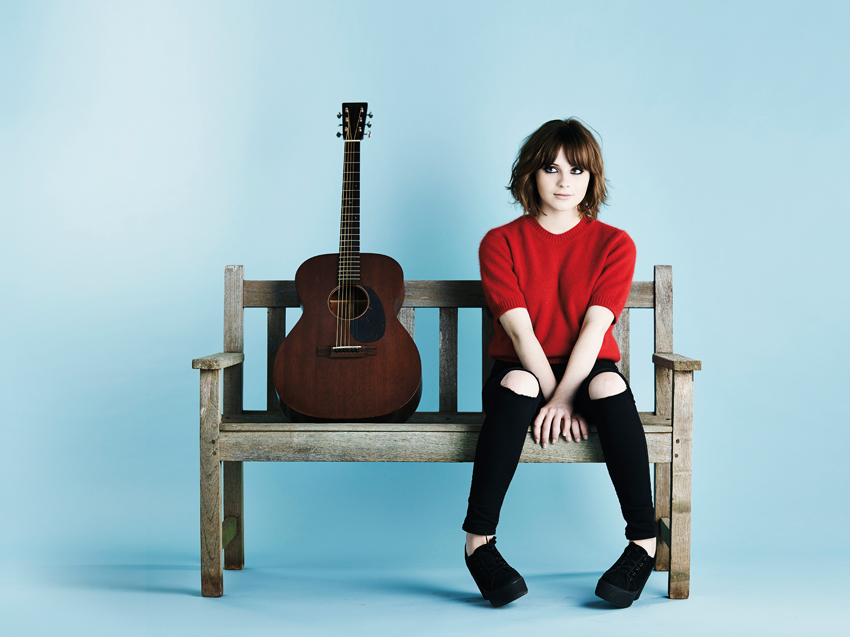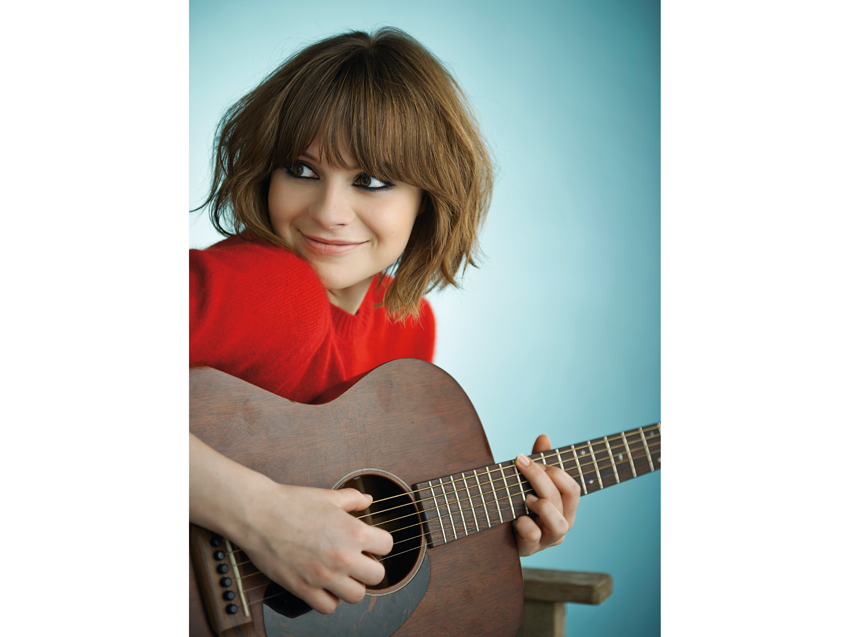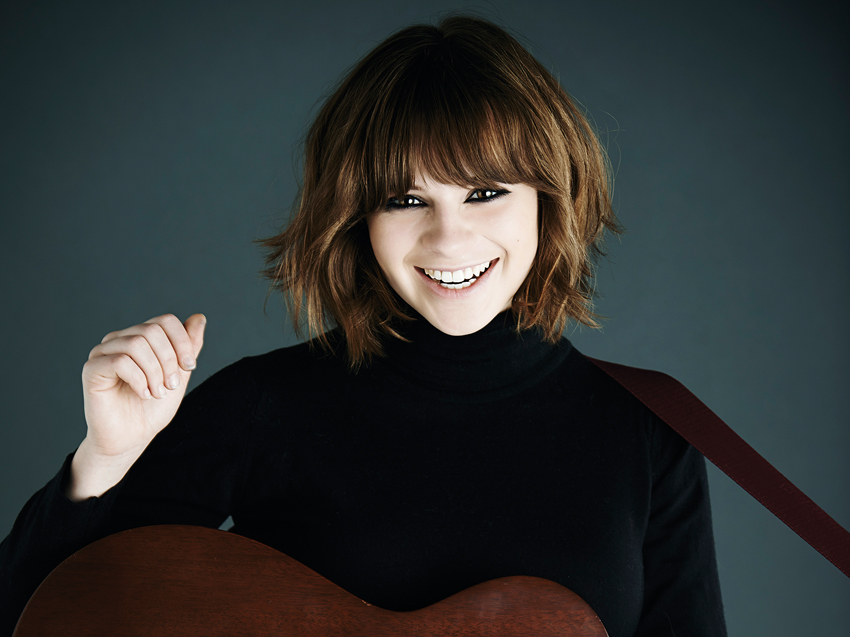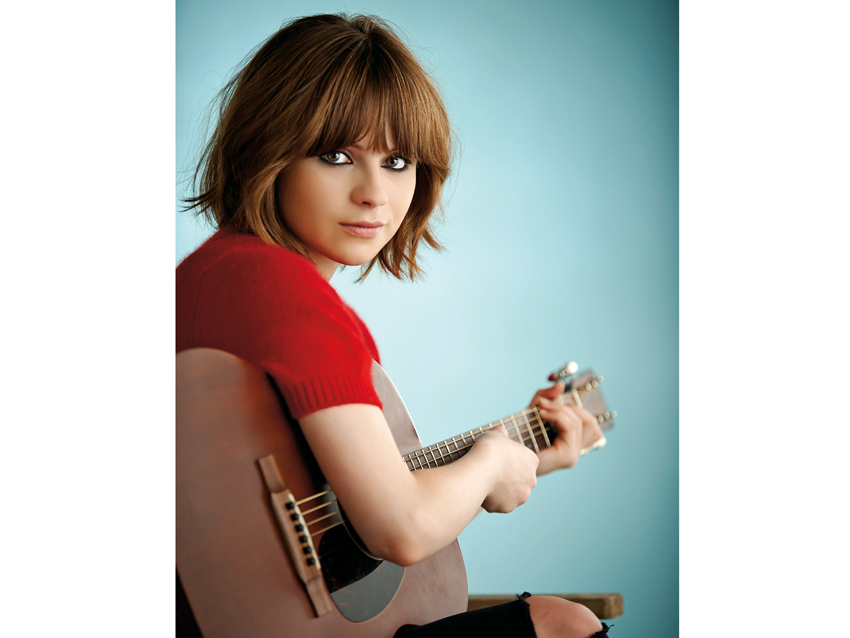Gabrielle Aplin on arenas, acoustics and Joni Mitchell
Singer songwriter talks being a 21st century artist

Gabrielle Aplin on arenas, acoustics and Joni Mitchell
Twenty-one year olds aren’t what they used to be.
Blinking blindly into the Aplin on stage during her 2013 tour limelight, many a bright pop star has been moulded, lavished with telephone-number budgets and sent off into the fame stratosphere, only to burn out ingloriously as if by some twisted quid pro quo for their meteoric rise.
Gabrielle Aplin is quite different. Her debut album, English Rain, hints strongly that there’s an older, smarter head on those shoulders, confirmed beyond doubt within the first five minutes of meeting her. References to Joni Mitchell, John Martyn and Bruce Springsteen trip out as credibly as they do to You Me At Six, Ed Sheeran or Katy Perry, as she recounts her slow and steady rise from self-published videos on YouTube to playing the UK’s biggest arenas.
2013 was the Wiltshire girl’s watershed year. She scored a UK Number One single in December 2012, helped along no doubt by its use a major TV advertising campaign. The perfect springboard for her full-length debut album?
“What song is that, I wonder?” she laughs, having been asked hundreds of times about her cover of Frankie Goes To Hollywood’s The Power Of Love and that John Lewis ad. “But yeah, absolutely – it was very surreal! It was a really lucky thing and I’ve achieved what I wanted: I wanted my album to come out.”
You’ve just finished your longest, biggest tour yet: how does that feel?
“It’s quite sad, actually, because since the start of summer we’ve just been touring around: I came home and I miss my friends. It was such a good experience. I mean, I’ve done eight tours, starting out on my own, playing tiny little venues and building it up each time. So this was my third tour with the band. The first five were completely acoustic.”
The elation of a big audience is presumably indescribable... so obviously we’re going to ask you to describe it?
“Well, it’s gradually built up to the Shepherd’s Bush [Empire]-type venues. Before that it was Koko, Scala, before that Dingwalls... So it had developed, but I’d never just gone straight to an arena before. I’d been doing 500-capacity venues in Europe, so there were crowds, but not arena crowds!
"Then I went to Amsterdam with John [Mayer], or playing the O2 or Wembley with him... Now, they were really big moments for me. But my gigs have always been similar: the chat in between the songs and the banter with the crowd. If the crowd are up for it, you completely forget about the room.”
Who’s playing guitar in your band with you?
“There was an amazing guitarist called Tom Longworth playing with me, and he’s great, but when it came to touring extensively and recording a lot, I just wanted to use my mates.
“My guitarist is called Tom Crouch – he’s really young, he’s just turned 20, and I knew he was just out of college. I found him doing his own songs on YouTube and thought he was amazing, so I asked him to come and play in the band with me.”

YouTube and building audiences
Let’s rewind a bit, to when you started putting out music on YouTube. How important was that exposure in establishing you as an artist?
“YouTube was really good for building a kind of core, loyal fanbase. I didn’t want to be a YouTube artist, as such. I mean, there are people who are able to release albums and live off YouTube, but I felt – and not in an arrogant way – that I could be commercial and credible if I really put my mind to it. I didn’t want to be a YouTube artist and I didn’t feel that I suited that, in a way. I was very loyal to the fans that were loyal to me on there – and it was great to actually meet these fans and connect with them.
“Then the ‘BBC Introducing’ opportunity was great for me [recorded in April 2011 at Maida Vale], in terms of connecting what I did on YouTube to the ‘real world’. I got a manager, and I set up a label so I could release my own music independently on iTunes, put my own tours on sale and built it from there. It just got bigger and bigger each time.”
You sound very savvy to the business side of things, rather than a pure focus on writing or singing. Does that go back to the things you studied at college?
“Yeah, I get involved with everything, but looking back, I didn’t really realise I was doing them at the time. I’m really interested in the business side of it. Before I’d even started doing music or having opportunities with my own music, I was studying production and business and stuff anyway. I knew there were so many jobs within the music industry – songwriting or session playing or working at a label – and I was really interested in how it all works.
“I actually wanted to do a production course. I went to sixth form [at school], but I got bored and dropped out, so I joined the course [at City Of Bath College] late and there were no spaces left, so I went on to Popular Music and did that. At the time, writing and singing were things I did for fun, little gigs around Bath and so on. I didn’t really know what I wanted to do, but I knew that I enjoyed it!”
People started noticing pretty quickly – when did it turn from hoping to become successful, to realising that it was actually happening?
“I stayed on my course while touring, and then it just became so busy that everything I was doing outside of college just took over: it took up all my time. But I was pretty oblivious to it, because it was building up over a number of years. It wasn’t a hit-in-the-face moment.”
Was there a hit-in-the-face moment, then?
“Things like not being able to leave the venue until the crowds of people have gone: that’s odd! And when I was in Japan recently, there were fans outside the hotel. ‘Hang on, there are people waiting at my hotel?!’ Those are the moments when you know that things are happening. But it’s not as if I’m Harry Styles or anything [laughs]. It’s still music-based, not celebrity-based.”
How do you feel about the other approach: reality TV – The X Factor – ever tempted for an audition?
“Oh no, no. No. It suits a certain kind of artist. You’ve got a massive voice and you want someone to write songs for you... If you wanted to be a big seller everywhere, instantly, it’s great. But I don’t really like that, y’know, I don’t think it should be about who I’m dating or what I look like. It should just be about my songs, and I want to protect that as much as I can.”
You’ve mentioned you like to help fund other artists – can you still do that now you’re on a major label?
“Definitely. When I signed to Parlophone, obviously I couldn’t release my own music any more, but I was able to keep all my previous releases. I couldn’t put that back into me, so I was putting it into other artists. I funded a few EPs and things; there’s a guy called Saint Raymond and we’ve just signed him to Atlantic, which is amazing. I’m also working with a girl called Hannah Grace, and she’s a singer-songwriter who has a wonderful voice.”
And you also ran a competition for new talent to win the support on your tour?
“I just wanted to do something cool. We’d chosen one support, but there were so many people coming to me, like via my agent or whatever, I hadn’t heard of these people, so I thought that maybe I could find some people that were even more under the radar. And we found some amazing people: a guy called Jack Williams in Bournemouth, and we actually got him back for Oxford. Amazing – played his guitar with loop pedals and so on.”
A lot of musicians of the generation previous to yours are really struggling to deal with the changes in the music business since physical album sales have decreased. Do you have a perspective on that?
“I guess you just need to realise that it’s gone elsewhere. People are buying fewer albums, but more people are going to gigs because that’s one thing that you can’t illegally download. And y’know, I haven’t had any problems with people buying my records. I think if you look after your fans... if people want to buy an album, they’ll buy it. I don’t buy loads, but I don’t think there’s loads of great music. Something really has to draw you in that much; nobody has any money, but if they’ll like it, they’ll still buy it. You just have to adjust, because [the industry] is changing.”
What does being on a major label bring for you?
“Parlophone is a proper heritage label: amazing. I mean, I had the indie label that I was able to chart with and do all these things with the resources I had, but I wanted for everything to keep progressing. I felt that I could do radio, for example, and there were other things I wanted to do but just didn’t have the funding. A bigger team around me means I can do more things, and I needed help. But what’s so great about Parlophone is that they didn’t change anything about me; they knew that what I was doing was working for me, so they took me on, and sent me off to make my album.”

Guitar playing and English Rain
The guitar playing isn’t the first thing you’ll notice about English Rain.
There are no solos, no anthemic riffs, no overt shows of technical prowess. Listen more closely, and you’ll hear a range of alternative tunings, driving strummed rhythm parts and delicately picked melodic accompaniment. Likewise live, it’s clear that Aplin is an accomplished player, doing everything to support the song and nothing to overpower it. How did she begin with six strings?
“I got my first guitar when I was 11,” she smiles. “It was an electric and I can remember just wanting to be Avril Lavigne! But I got annoyed with having to plug it in and play with amps and pedals and stuff. Then I got given a cheap acoustic, a Tanglewood, and I thought it was awesome because I could play it anywhere! That was my first ‘proper’ guitar, I guess, and I picked it up again when I was about 14, and since then I’ve just been playing and playing.”
And piano - which was first: piano or guitar?
“Piano. I’ve grown up with a piano in the house and that’s where I started to be able to learn things by ear. Guitar kind of happened, and I was using it just for writing at first. Then I was writing so much that I began to realise that I knew how to play, and that’s when I started getting nerdy about it. Recently, I’ve been writing a lot on guitar, but I’ve just moved into a house with a piano in it, so that may change. I haven’t had one in the house for about two years, so it’s very exciting.”
Did you have guitar lessons?
“No, I completely taught myself, and I’m grateful for that in a way. Sometimes I look at my guitarist Tom, and he’s ridiculous: I mean, amazing. And he never had lessons either, he’s got his own way of playing and I can tell that it’s special. Same thing if I’m listening to John Mayer or Eric Clapton. For me, if I’d had lessons, I probably wouldn’t play in the way that I do.”
Who are your biggest guitar influences?
“Joni Mitchell, especially for me because of the open tunings. She was one of those singer-songwriters who didn’t sound too obvious. I love John Martyn and I found that with Nick Drake – especially Nick Drake – he had this way of playing that was just so ‘him’ and even if you learned the exact parts, exactly the same, you can never get the same feel. You can tell it’s him even before he starts singing, and that’s something that’s amazing and special to have. It made me really want to home in on things that were ‘my thing’, to make my own sound and my own way of playing.”
You mention open tunings...
“I love open D, G and E, and also just tuning everything down a tone, or even to C – just a big, open sound. I think Joni Mitchell used to do that. I wanted to experiment so that it didn’t sound like I was just playing a load of chords on the acoustic guitar, especially when I was playing on my own, as it could sound a bit thin and I wanted something a bit deeper and warmer. Tuning down and using different tunings definitely did that for me.”
Electric guitars – we’ve seen you playing some...
“I’ve been dabbling a little bit. Tom has a Gretsch that is just an absolute dream. I’ve been having a go on that, and that’s something I want to carry on doing. I’m just experimenting because I’ve never really gigged electrics before and I don’t really know much about what I’d use, so I’m playing lots of things and experimenting at the moment.”
What’s your view of the singer-songwriter ‘scene’? It seems like a good time for people who sing and play: would you agree?
“Absolutely. There are loads of artists and it’s not just ‘singer-songwriter’ music. There are lots of pop artists writing their own songs; I love Ben Howard, I think Ed Sheeran is a great example. People are writing about real situations that people can relate to. Maybe people are more attainable. You feel like they’re singing about your life when it’s a good singer-songwriter; they’re writing about real things. I also think that people just want something fresh and easy to listen to. There’s so much going on in music, so it’s nice when something is organic and there are a lot of people trying to do that now. I think it’s great!”
Album number two must be heavily in discussion. Can you reveal anything that we can expect?
“I want to release another album next year, and maybe some other little cool things like an EP. I want to spend a lot of next year writing. Nothing’s really planned yet, I just want to spend a lot of the year being creative.
“I got involved a bit with the orchestral side of things, strings, the anthemic-ness of things with English Rain, so I kind of want to do something a bit more raw and maybe experiment with a different kind of production. I don’t want to change anything too drastically, but whatever naturally comes.”
There are probably people reading this who’d love to do something similar to you. apart from needing a lot of talent, what advice would you give them?
“I didn’t really realise I was doing it at the time, but I made the most of the new resources that were available to me, especially the internet. It’s just using all of those resources to your best advantage – Facebook, Twitter, all that. Putting your music online is really important, too: for free! I don’t think you should sell your first EP for £5 or whatever. You shouldn’t even care about money – just about getting it out there and making the most of all your opportunities. If you get offered a local gig, do it, wherever or whatever it is. Don’t expect too much too soon: you have to work your way up.”

Gabrielle's Guitar
Gabrielle is most often seen with one of her two Martin 000-15M, models, an all-mahogany guitar from the popular 15 Serie
s.
“I was writing with a guy named Luke Potashnick [Rooster, lots of sessions, The Temperance Movement – Ed] ] who’s an amazing guitarist,” she explains on how she came by the guitar. “I was going through his guitar collection and his Martin, as soon as I was playing it, I was thinking, ‘This is just ridiculous’. So he put me in touch with Martin in the UK. I tried a few guitars and I chose the 000-15.
“I just loved it. It’s small, but the sound is really warm without being too bright. Tom [Crouch, Aplin’s guitarist] hates me because I never change my strings. I like them sounding old and dead... but without sounding too, um, s**t! [laughs]. They’re not too flouncy or pretentious; just beautiful. And now I have two.”

